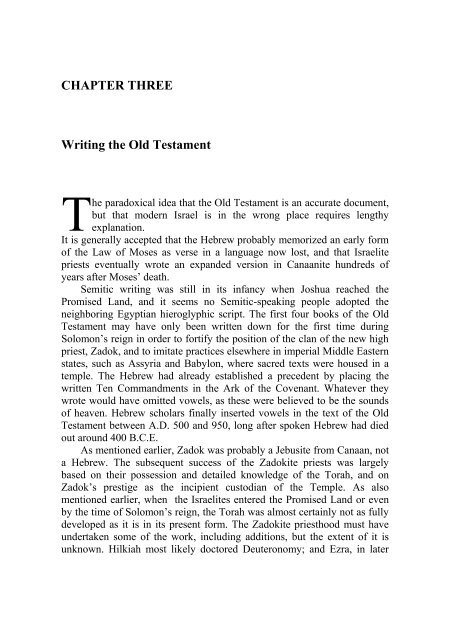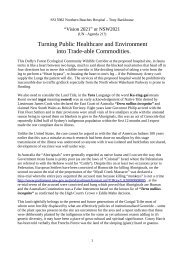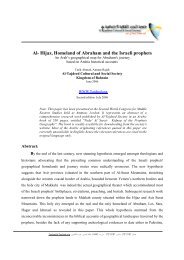Sheba
Sheba
Sheba
Create successful ePaper yourself
Turn your PDF publications into a flip-book with our unique Google optimized e-Paper software.
CHAPTER THREE<br />
Writing the Old Testament<br />
T<br />
he paradoxical idea that the Old Testament is an accurate document,<br />
but that modern Israel is in the wrong place requires lengthy<br />
explanation.<br />
It is generally accepted that the Hebrew probably memorized an early form<br />
of the Law of Moses as verse in a language now lost, and that Israelite<br />
priests eventually wrote an expanded version in Canaanite hundreds of<br />
years after Moses’ death.<br />
Semitic writing was still in its infancy when Joshua reached the<br />
Promised Land, and it seems no Semitic-speaking people adopted the<br />
neighboring Egyptian hieroglyphic script. The first four books of the Old<br />
Testament may have only been written down for the first time during<br />
Solomon’s reign in order to fortify the position of the clan of the new high<br />
priest, Zadok, and to imitate practices elsewhere in imperial Middle Eastern<br />
states, such as Assyria and Babylon, where sacred texts were housed in a<br />
temple. The Hebrew had already established a precedent by placing the<br />
written Ten Commandments in the Ark of the Covenant. Whatever they<br />
wrote would have omitted vowels, as these were believed to be the sounds<br />
of heaven. Hebrew scholars finally inserted vowels in the text of the Old<br />
Testament between A.D. 500 and 950, long after spoken Hebrew had died<br />
out around 400 B.C.E.<br />
As mentioned earlier, Zadok was probably a Jebusite from Canaan, not<br />
a Hebrew. The subsequent success of the Zadokite priests was largely<br />
based on their possession and detailed knowledge of the Torah, and on<br />
Zadok’s prestige as the incipient custodian of the Temple. As also<br />
mentioned earlier, when the Israelites entered the Promised Land or even<br />
by the time of Solomon’s reign, the Torah was almost certainly not as fully<br />
developed as it is in its present form. The Zadokite priesthood must have<br />
undertaken some of the work, including additions, but the extent of it is<br />
unknown. Hilkiah most likely doctored Deuteronomy; and Ezra, in later




